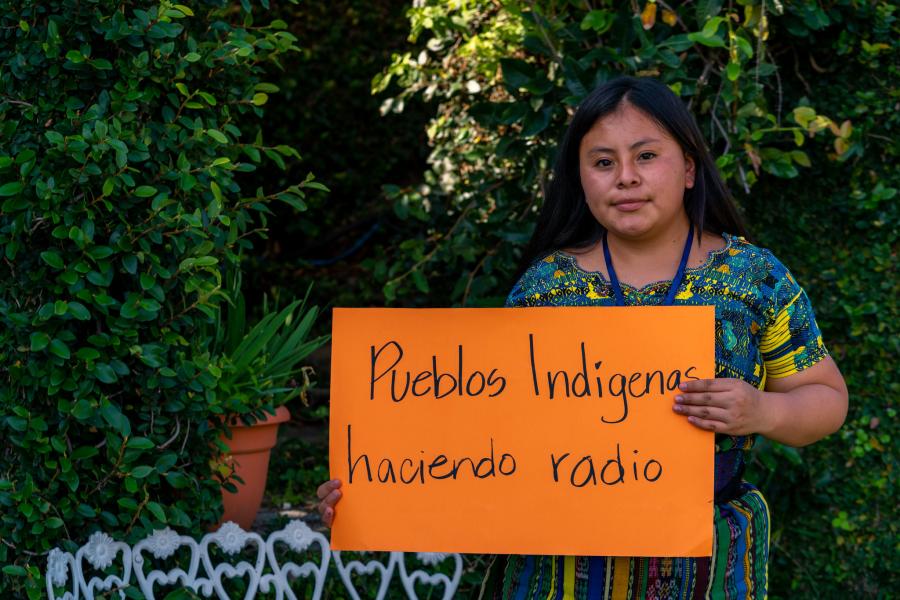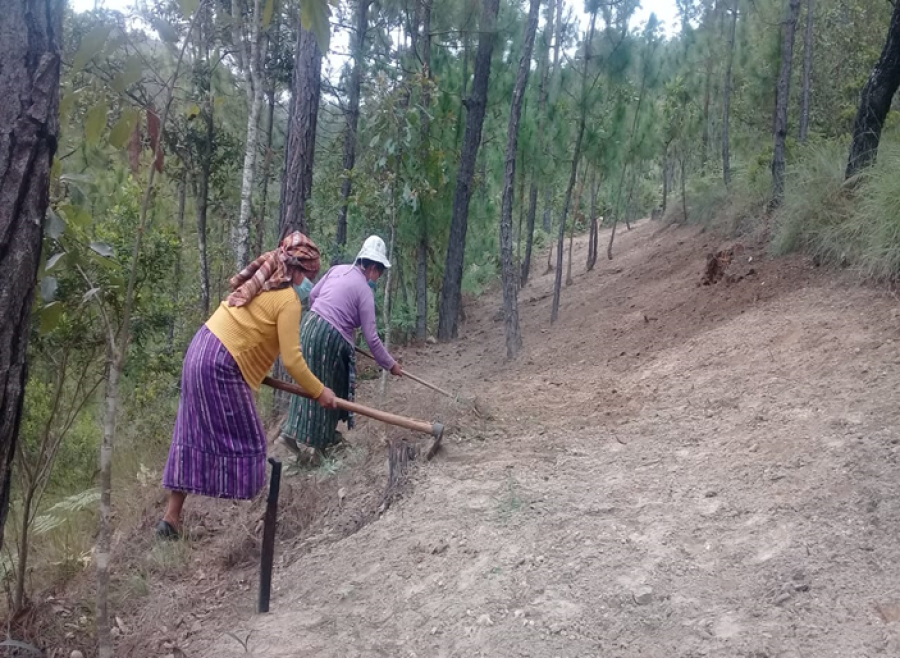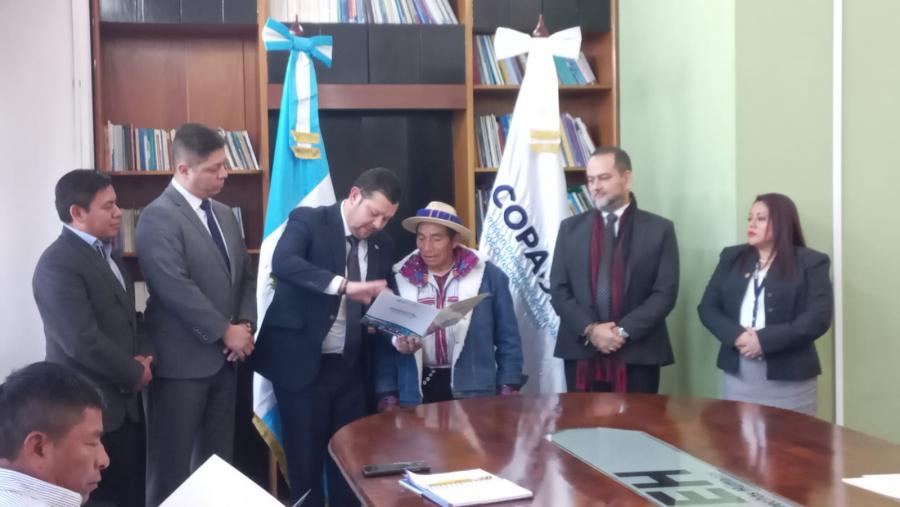While the information contained in this report applies to the western highland area of Guatemala, similar if not identical conditions can be found in other regions of the country.
Based on interviews and observations gathered in October of 1983, the following has been discovered:1) The mostly Indian inhabitants of this region are tremendously restricted in physical movement.
Due to the system of obligatory Civil Patrol service all men in any given hamlet are accounted for. If a man does not show up for duty, he is summarily executed by the army and branded a "subversive" post facto. If he appears for duty in a different hamlet, i.e., after having fled his own, the Civil Patrol has instructions to identify him and arrange an "accident," usually with the implication that the man was a guerrilla. The same holds true for those attempting to return to their own villages under the so-called "amnesty"! Several sources confirm that the army has lists of all those who have returned and that these lists are handed over to the Civil Patrols. Once the returnees have been eliminated the names are handed back to the army. There is universal agreement that refugees, internal or external, cannot return as they are on death lists. As one man put it, "You know what kind of reception they get..." (making the gesture of a machine gun).
2) There is also tremendous psychological restriction and control in this area.
The "tattle-tale" system of secret accusations, secret arrests, and "disappearances" is in full effect here, much as in Argentina in 1977. Consequently, there is anxiety about speaking in public and suspicion of anyone who might be within earshot. This frame of mind coupled with the current army propaganda campaign that "Guatemala is at peace now" and that "things are getting better," is so influential that nearly every conversational exchange includes a verbatim repetition of propaganda slogans. Fear of being labelled "subversive" and the fact that men, women, and children are subject to being "disappeared" (i.e., tortured to death) has made Guatemalans very close-mouthed about their situation. Accusations need not be substantiated and the accuser's identity need not be revealed.
3) There has been an increase in visible army presence since last June.
Over the past four months, army bases around Huehuetenango, Quiche and the Lake area have been fortified and expanded. Army units, performing "operations," are also increasingly visible in this area.
In addition many people in this area are still being killed, though not as overtly as in the past. Disappearances are more common than massacres, though the actual number killed might be comparable. One of the evidences of continuing deaths is found in the steady flow of widows into population centers. There are currently 3,000 widows in Chichicastenango alone. There is no way to calculate how many women have been killed. When asked if these deaths could be due to guerrillas, the reply was "There are no guerrillas here. Maybe a few years ago. But we never knew what they looked like."
4) The action of the army through Civil Patrols is radically changing the composition of the countryside and the lifestyle of the people who live there.
With the Civil Patrols under instructions to bring in all "suspects" for interrogation during the day, and under orders to shoot anybody after 6:00 p.m., many people are perceiving life in the country as too hazardous. Perhaps even more damaging is the restriction on farming. Required proof of ownership has severely affected landless peasants who have traditionally rented land. In addition, many Indians do not have legal proof of ownership and are afraid of trying to obtain it due to the risk of "standing out" and becoming a possible target of a secret accusation. Consequently, many landless peasants and small landholders are crowding into already overcrowded towns to seek nonexistent employment while their fields lie fallow (for possible future expropriation).
Because fewer people are planting, the average peasant family has less to eat. There is a noticeable increase in homeless children in the larger population centers as well as an increase in beggars, mostly women and children. There have even been statements to the effect that people are starving because of the elimination of traditional corn plots.
5) There has been a rapid spread of evangelical sects in the highland area, particularly in the areas of strongest military presence.
Although many Protestant groups have been in operation in Guatemala in the past, the recent upsurge in sects such as Seventh Day Adventists, Jehovah's Witnesses, Pentecosts, and other lesser known names indicates the changed nature of the evangelical drive, particularly in light of political developments over the past year and a half. The evangelist sees himself as apart from political events. As one evangelist (non-Indian) put it, "Somos evangelistas. Estamos afuera de todo" (We're evangelists. We're outside of it all"). Army and government actions are consequently not their concern. When asked about the killings around his town, an evangelical pastor (non-Indian) from Jacaltenango explained that although the actual massacres had been enacted by the army, it was not the army that was to blame. The army was merely the instrument of Satan and as such could not be held responsible for its actions. It is interesting to note that most, if not all, of the pastors in these areas are non-Indian and preach to a largely Indian audience in Spanish. Services are often held nightly and can last upward of three hours. The evangelical line is, of course, anti-traditionalist. "The Indians have lost the way of true worship and must be helped to see the way."
The appeal of evangelist groups to highland Indians is, in part, that these groups offer not only a psychological escape from persecution, but also seem to enjoy an immunity from the army. While they may claim that the reason they have not been attacked is because God is on their side, it is clear that the evangelical push to convert the Indians, change their spiritual orientation, remove indigenous figures of authority and power, and fractionalize communities indeed serves the interest of the army, and for these reasons and others the evangelists continue to be supported by the army.
Conclusion
Conditions in Guatemala, far from improving, may actually be deteriorating. Actual wages have declined and except for season coastal labor, work is scarce. Indians who have enjoyed a certain degree of prosperity and involvement in the political and economic system are under constant threat of attack through the "tattletale" system. Traditional ways of life are being threatened by the army and the evangelical mission. Thus, the Indian population, having been dispossessed of any advantages brought by the post-earthquake reconstruction programs, remains under physical, psychological, spiritual and economic attack. Perhaps the most insidious element is the local population itself, which has been coerced to maintain a concentration camp-like control over its own members. It is obvious that the "peace" and "development" plan for Guatemala under the current government means the peace of the graveyard for much of Guatemala's highland Indian population and development exclusively for the benefit of governmental concerns.
The following is a translation of an interview with a former Indian leader in El Quiche.
Q. What would you like to tell the American people?
A. We know that groups come down here who want to help us, and who want to know more about how we are living. But they can only talk to the officials. They don't get a chance to talk to the people. So they don't know reality. That's why they leave thinking that things are better now in Guatemala. I would like to tell you the reality of Guatemala, so you can tell them over there, in the United States.
All men, sometimes as young as ten years of age, must join the Patrulla de Autodefense Civil (Civil Patrol). They call it "self-defense." It's very ironic. If a man refuses to join, then the army shoots him and says he is a subversive. We have to go out once a week for 24 hours. We receive no pay which is a hardship for us because we are now in bad times. In our group there are six. Three of us are given guns. We walk around the countryside of our hamlet in pairs. If we see anybody walking around, even people we know, we have to bring them to the army base for interrogation. After 6:00 p.m. we have to shoot anyone we see.
The Civil Patrols do not let us farm our lands now. We aren't planting. I have some land but I am afraid to plant it because it belongs to my father and he is escaped now. So, I tried to rent it. When the man went to plant my field, the Civil Patrol asked him, "Is this your land?" "No, it belongs to Sebastian," he said. Then they took him to the army base. There they asked him again who owned the land, and when he gave my name they asked, "How do you know the land is his?" "Well," the man said, "he rented it to me so it has to be his." They let the man go back and plant, but they said only for this year. And they told him not to pay in corn, but just to give me a few cents and that he should ask to see my papers. I have the papers. They are legal and everything. But I don't want to show them. Because if I do they'll kill me and take my land. So that is why our fields are idle and we are hungry.
We can't leave here either. One family went to [a neighboring town]. They stayed there a long time. They had nothing and they were very poor. Then the Civil Patrol came. The man could not join or they would see he was not from around there and they would kill him. So he decided to bring his family back. There was the amnesty. They turned themselves in at the base. For three days they kept them there for interrogation. "Where are your other companeros?" they kept asking. "We have no companeros. We left alone, out of fear," they said. Finally the army let them go back to their old house and gave them their papers. I saw that family because the man came to me for a job. They were very poor. Everything in their house had been stolen. "Of course you can have a job," I said. But he never came back. He and his son had joined the Civil Patrol. They went out twice. The third time they didn't come back. The wife went crying with her children to look for them. But the Civil Patrol said they had not come back because they had joined their "companeros," the subversives. But really they were "disappeared." The army had given the Civil Patrol their names. Now the widow says it would have been better if they had never returned. They still haven't found the bodies. That was eight days ago.
The men in charge of disappearing people have a special name. They are located in the army base but they don't wear uniforms. We know them because they are from around here. During the day you can recognize them because they wear fine boots. They always wear good clothes. But when they come to get you they cover their faces and they don't speak. And when they take you away they take your possessions as well. I used to have a television set. But the ones they take aren't guerrillas. They are just people.
Many people are coming into the town now. They are hungry. They have nothing. They have left from fear. We are starving here. There is no work and we can't leave. They, in the government, say there is peace now, and that things are better. But it's a lie. It's the same as before. They are lying and we are dying of hunger. Now you can't think of development. You can't think of anything. If you die of hunger - that's better. If I had the money I would escape from here but I have a pile of children and they would never survive going days without food. Here we live in fear. When a helicopter passes overhead the children hide. And so do we.
Article copyright Cultural Survival, Inc.



